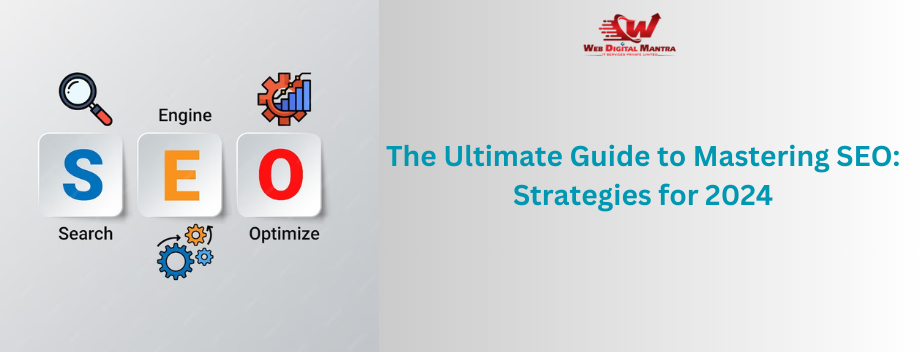
Search Engine Optimization (SEO) is the cornerstone of digital marketing, playing a pivotal role in how websites rank on search engines like Google. In an era where online visibility can make or break a business, mastering SEO is more important than ever. This comprehensive guide will delve into the intricacies of SEO, offering actionable tips and strategies to help you stay ahead of the curve in 2024.
Before diving into the more complex aspects, it's crucial to understand the fundamentals of SEO.
What is SEO?
SEO stands for Search Engine Optimization, a set of practices aimed at improving a website's visibility on search engines.
Why is SEO Important?
Increased visibility leads to more traffic, which can result in higher conversions and revenue.
How Do Search Engines Work?
Search engines use algorithms to crawl, index, and rank websites based on relevance and quality.
SEO (search engine optimization) helps your website rank higher in search results, driving organic traffic without paying for ads. It involves understanding what people search for and optimizing your site's content and technical aspects for search engines.
Keywords are the terms and phrases that people use when searching for information online.
Importance of Keywords
Keywords help search engines understand the content of your site and match it with user queries.
Types of Keywords
Tools for Keyword Research
How to Choose the Right Keywords
On-page SEO refers to optimizations made directly on the website.
Title Tags
Craft compelling and keyword-rich titles.
Meta Descriptions
Write concise and persuasive meta descriptions to improve click-through rates.
Header Tags (H1, H2, H3, etc.)
Use header tags to structure your content and include relevant keywords.
Content Optimization
Ensure your content is high-quality, informative, and includes your target keywords naturally.
Image Optimization
Use alt tags and optimize image file sizes to improve load times.
Technical SEO involves optimizing the backend structure of your website.Site Speed
Faster websites rank better and provide a better user experience.
Mobile-Friendliness
Ensure your site is responsive and works well on mobile devices.
XML Sitemaps
Submit sitemaps to search engines to improve crawling and indexing.
Robots.txt
Use robots.txt files to control which pages search engines can crawl.
Structured Data (Schema Markup)
Implement structured data to help search engines understand your content better.
Off-page SEO focuses on activities outside your website to improve its authority and ranking.
Backlinks
Earn high-quality backlinks from reputable sites to boost your site's authority.
Social Media Engagement
Increase your content's reach and engagement through social media platforms.
Guest Blogging
Write guest posts on relevant websites to build backlinks and drive traffic.
Influencer Marketing
Collaborate with influencers to enhance your brand’s visibility.
Local SEO is essential for businesses that serve specific geographic areas.
Google My Business (GMB)
Optimize your GMB listing to appear in local search results.
Local Citations
Ensure your business information is consistent across local directories.
Reviews and Ratings
Encourage satisfied customers to leave positive reviews.
Local Keywords
Target keywords that include your city or region.
Content is king in the world of SEO. Quality content can significantly improve your search rankings.
Blogging
Regularly publish high-quality blog posts on topics relevant to your audience.
Content Diversity
Use different content formats like videos, infographics, and podcasts.
Content Strategy
Develop a content calendar and plan your content around key events and trends.
User Intent
Create content that addresses the specific needs and queries of your audience.
Tracking and analyzing your SEO efforts is crucial to understanding what's working and what needs improvement.
Google Analytics
Use Google Analytics to monitor your traffic, user behavior, and conversions.
Google Search Console
Track your site's search performance, fix issues, and understand how Google views your site.
SEO Tools
Utilize tools like SEMrush, Ahrefs, and Moz for in-depth analysis and insights.
Key Metrics to Track
Stay ahead of the competition by implementing advanced SEO strategies.
Voice Search Optimization
Optimize for voice queries by focusing on natural language and long-tail keywords.
Artificial Intelligence (AI) and Machine Learning
Leverage AI tools to analyze data and improve your SEO strategies.
Video SEO
Optimize your videos for search engines by using relevant keywords in titles, descriptions, and tags.
User Experience (UX)
Improve your site’s UX by focusing on navigation, design, and usability.
Avoid these pitfalls to ensure your SEO efforts are effective.
Keyword Stuffing
Overloading your content with keywords can lead to penalties.
Duplicate Content
Ensure all content on your site is unique and valuable.
Ignoring Mobile Optimization
A significant portion of users browse on mobile devices, so ensure your site is mobile-friendly.
Neglecting Technical SEO
Regularly audit your site to fix technical issues that can affect your rankings.
Stay informed about the future trends in SEO to keep your strategies up-to-date.
AI and Automation
AI will continue to play a significant role in SEO, helping to automate and improve various aspects.
Search Engine Algorithm Updates
Stay updated on the latest algorithm changes to adapt your SEO strategies accordingly.
Content Personalization
Tailor your content to individual user preferences and behaviors for better engagement.
Privacy and Data Security
Ensure your site complies with data protection regulations to build trust with users and search engines.
Mastering SEO is a continuous process that requires staying updated with the latest trends and best practices. By understanding the basics, optimizing your content, and leveraging advanced strategies, you can improve your website’s visibility and drive more organic traffic. Remember, SEO is not a one-time effort but an ongoing commitment to delivering value to your audience and staying ahead in the competitive digital landscape.
1. What is SEO for beginners?
SEO (search engine optimization) is the process of improving the performance, experience, and authority of your website so it can gain better visibility in search engines like Google.
2. How exactly does SEO work?
SEO utilizes things like keywords, internal and external links, and optimized content to help search engines find content and rank websites higher on search engine results pages (SERPs).
3. How to get 100% SEO?
4. What is an SEO tool?
SEO tools are used to assist website owners in ranking higher in search engine results.
 Bhoomika Hiremath
Bhoomika Hiremath

The ultimate guide to mastering SEO provides key strategies to improve your website's visibility and rankings in search engines for 2024.

This guide offers comprehensive strategies to enhance SEO performance in 2024, covering the latest trends and best practices. It's an essential resource for anyone looking to boost their online visibility and traffic.
Copyright @2020. All Rights Reserved by WEB DIGITAL MANTRA IT SERVICES PVT LTD
Post Reviews